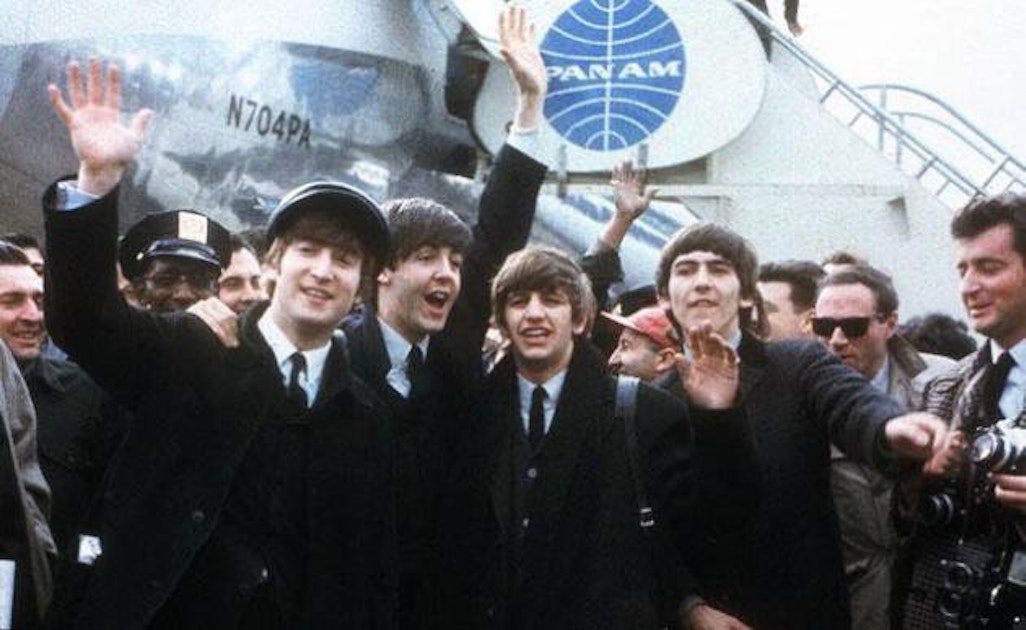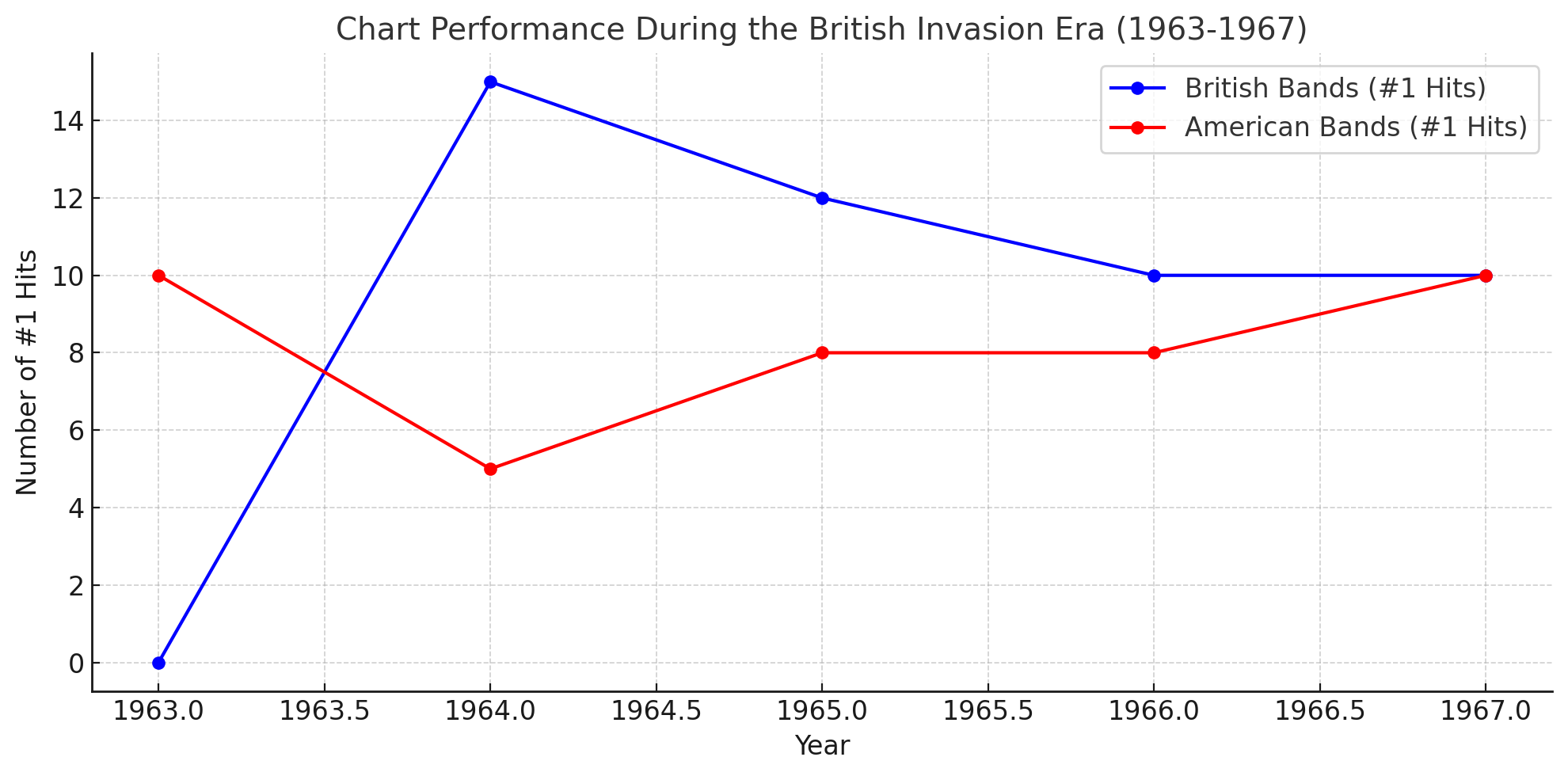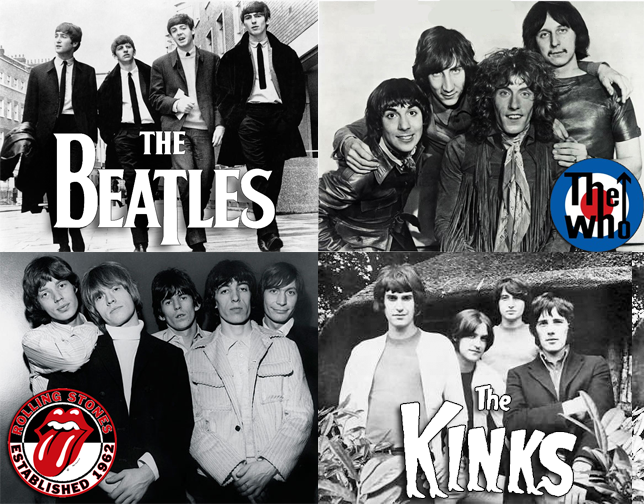The British Invasion of the US music charts in the early 1960s

Breaking the States is the ambition of every British band and singer.
Despite the waning popularity of music as a consumer art form the music industry is still a major part of the UK economy with America as the most important export market.
America's a tough nut to crack and not all who try succeed. How can one UK artist break into the States when another cannot?
Unlikely acts to succeed include the miserable Morrissey, who managed it despite being a minor player in the UK market. Contrast that with the hugely popular (in UK, Europe, and far east) Robbie Williams who tried and failed miserably.
There was a time however, when British music ruled the US music charts and airwaves, when just being British ensured automatic success.
It’s an interesting story, this is how it began.
Origins of the The British Invasion
Everyone loves an origin story.
The British Invasion was a moment in time when the dominance of US acts in the US charts was broken. At the time the music industry globally was structured very differently. Music didn’t travel unless labels had distributors in different territories. There was little cross pollination of genres and styles. Each country had its own and the US was already rich with Blues, Swing, Soul, Jazz and the new kid on the block – Rock & Roll.
In the early sixties a trickle of Rock and Roll records found their way across the ‘pond’ to Britain via sailors who brought it to port cities, notably Liverpool, where Liverpool bands embraced American music, put a new slant on it, and sold it back to America!
What was special about Britain. Why didn’t any other country invade the US charts? Britain was at a great advantage because of the common language and shared heritage.
But it wasn’t about being British, it was primarily about talent, and that talent was geographically tightly focused around Liverpool with The Mersey Boom as predominantly the most important element in The British Invasion.

Timeline
1963: British Bands had minimal impact as the British Invasion had not yet started. Notable British acts like Cliff Richard had limited chart presence but the seeds were showing.
The Beatles release their first hit "Please Please Me," marking the start of Beatlemania. December 63 as well as tantalizing glimpses of their performances on Walter Cronkite’s newscast and The Jack Parr Show — the Beatles’ February 7th landing at New York’s Kennedy Airport drew huge screaming crowds of female teenagers. No one had seen anything like it before.
1964: The Beatles appear on the premier late-night show in the U.S. sparking mass hysteria. The group’s February 9th appearance on The Ed Sullivan Show drew a TV audience estimated at 70 million, the largest in the history of the medium. The ‘generation gap’ became apparent. During the first week of April the Beatles occupied twelve positions on the Top 100 — and every position in the Top Five. They were “Can’t Buy Me Love,” “Twist and Shout,” “She Loves You,” “I Want to Hold Your Hand” and “Please Please Me.”
1965: Now well established, British bands continued dominance. The Rolling Stones got a delayed start in the U.S. They didn’t enter the fray in a major way until 1965. After minor hits in the Top Ten with “Time Is on My Side,” and “The Last Time,” “(I Can’t Get No) Satisfaction” charted with a bullet. The fake rivalry between the Stones and the Beatles was probably manufactured by the record company to sell more records. They were friends and the Beatles wrote the Stones first #1 (I wanna be your lover). Nevertheless, the question “who is the best band – the Beatles or the Stones?” was on every teenager’s lips, and you had to choose! This confirmed the cultural influence music was having. Music was having a good time, the economy was having a good time, the conditions were right.
The statistical high-water mark of the British Invasion fell on June 18th, 1965. On that date, no fewer than fourteen records of British origin occupied the U.S. Top Forty. It was a record that stood until July 16th, 1983, when the second British Invasion led by Duran Duran, Culture Club and the Police — landed eighteen hits on the chart.
1966: The Who release "My Generation," an anthem for the youth. The US countered with the Monkees a fictional band from a TV show, but they were sanitized and just weren’t authentic like the British bands.
1967: Evolution of British rock (e.g., The Beatles’ "Revolver"). British bands continue to dominate American charts, ushering in the "Summer of Love." Although the Who was enormously influential in swinging London, the band’s impact on America was not largely felt until the tail end of the Invasion, with “I Can See for Miles” rising to Number Nine in late 1967.

How it ended
Several factors contributed to ending the British Invasion
- Like all fashions it faded
- The first ever example of Cancel culture: A John Lennon interview with an offhand (and often inaccurately quoted) comment that “The Beatles were bigger than Jesus” which caused an evangelical backlash where people were goaded into burning their records in protest by attention seeking radio DJ’s
- The "Summer of Love" ended: The Summer of Love is generally regarded as having ended with stabbings by a Hells Angels biker gang during a Rolling Stones concert at Altamont CA. The Manson Murders also were blamed, and the Beatles were linked through Helter Skelter.
- The Beatles stopped touring and made a studio album that astonished the world Sergeant Peppers opening a new range of possibilities such as concept albums, extended solos, and exotic instrumentation which challenged the notion of disposable music. The boundaries we're becoming undone.
Even when the British Invasion was over the UK was now a major player. All this attention meant London was transformed into a swinging city and it is significant that Jimi Hendrix, unknown in his native US, succeeded there before returning.
The British Invasion was a breath of fresh air, arguably a revolution that couldn’t have happened internally. Its longer term significance is in the shift it brought to US bands, who were inspired to form, write their own songs with creative control that the Beatles had proved could also sell records. It paved the way for all other British bands to penetrate the US market. It set the stage for britpop in the 90's. It didn't really end continued sporadically but returned to critical mass multiple times creating a tradition with the second, third and fourth British Invasions.
Comparative Analysis Summary
Number of #1 Hits (1963-1967):
|
Year |
British Bands (#1s) |
American Bands (#1s) |
|---|---|---|
|
1963 |
0 |
10 |
|
1964 |
15 |
5 |
|
1965 |
10 |
7 |
|
1966 |
8 |
8 |
|
1967 |
6 |
10 |
Number of Top 20 Hits (1963-1967):
|
Year |
British Bands (Top 20) |
American Bands (Top 20) |
|---|---|---|
|
1963 |
5 |
50 |
|
1964 |
30 |
25 |
|
1965 |
35 |
30 |
|
1966 |
40 |
40 |
|
1967 |
30 |
50 |
Records Broken by British Bands:
1964: The Beatles hold the top 5 positions on the Hot 100 (April 4).
1964: Most #1 hits by a single band in a year (The Beatles).
1967: The Beatles’ “Sgt. Pepper’s Lonely Hearts Club Band” sets new artistic and commercial benchmarks.
Records Broken by American Bands:
1966: The Beach Boys’ “Pet Sounds” redefined the album format.
1967: The Doors’ self-titled debut album introduced psychedelic rock to the mainstream.